Water is an essential resource, but access to it is becoming increasingly difficult for many populations around the world. Population growth, rapid urbanization, and climate change exacerbate the situation.
In India, the water crisis is particularly alarming. Over-exploitation of groundwater, inadequate infrastructure, and unpredictable rainfall make access to water more complicated. Today, around 600 million Indians face shortages.
In the state of Jharkhand, located in northeastern India, people are affected by recurring floods. Meanwhile, the state of Bihar in the south regularly experiences periods of drought, complicating the lives of residents. Both regions face contrasting climate challenges that severely impact their livelihoods.
Learn more about the water crisis
Towards Sustainable Water Management
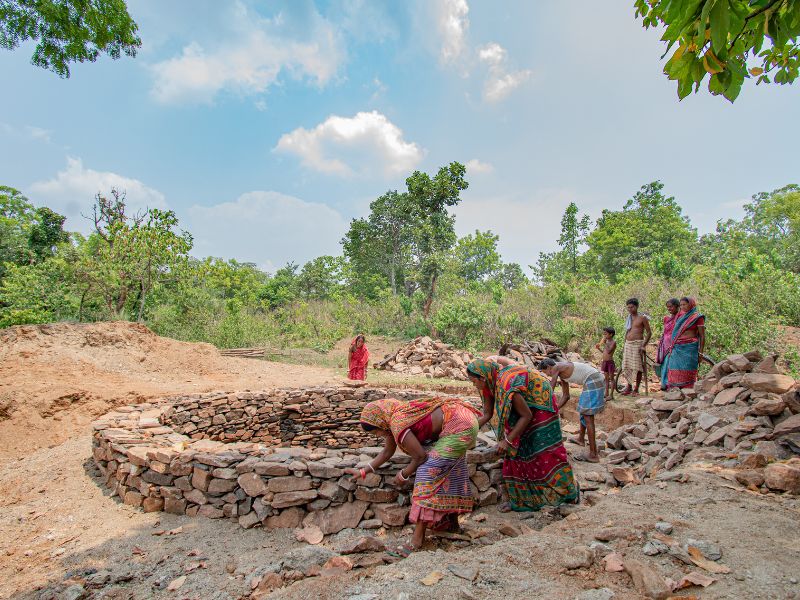
Since 2013, Karuna-Shechen has developed programs to address water and sanitation issues in our intervention areas. Faced with growing shortages, these initiatives ensure access to water for communities throughout the year.
In this context, efforts focus on two main areas: reducing water waste and creating new sources. To ensure the effectiveness of these initiatives, local populations are systematically involved in decision-making and participate in construction.
Review water access projects in images
Solutions Tailored to Local Needs
Various initiatives are implemented in response to the water crisis at both the individual and community levels.
Home-based Solutions
Since 2013, a rainwater harvesting system (RWH) has been deployed in households in southern Bihar. 1,000-liter tanks are installed to store rainwater collected from rooftops. Communities build cement platforms to support the tanks. Karuna handles the installation of the tanks and the pipes that channel water from the roofs to the tanks.
The results are encouraging: thanks to rainwater harvesting, households use their toilets more frequently and engage more in home gardening.
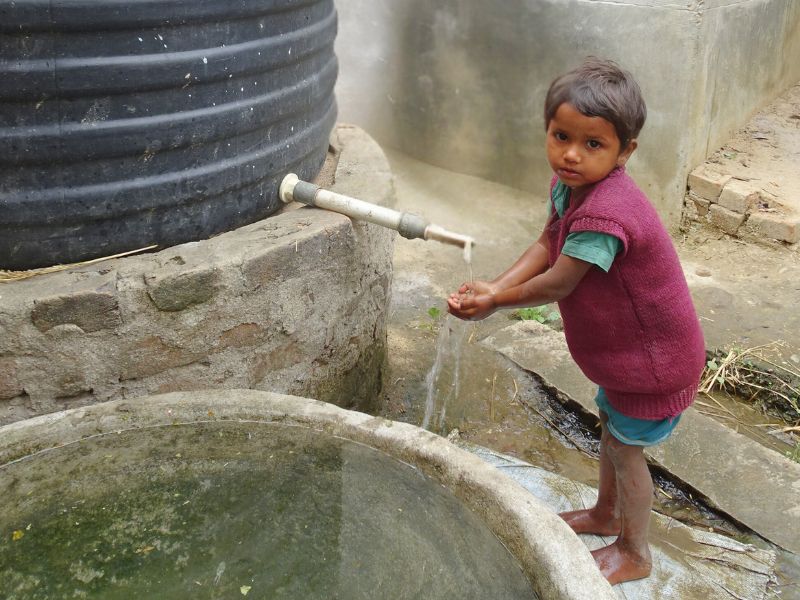

For the past two rainy seasons, the RWH tank has been a game-changer for us. It provides a steady supply of water for household cleaning, washing, and animal care. We are using the stored water not just for irrigating our small plot of land but have also shared with neighboring families for their agricultural needs. I offer heartfelt thanks to Karuna-Shechen for relieving us from the daily struggle to fetch and store water.
Jagta Devi, resident of Khairiyawan, Mohanpur
Water shortages in rural areas severely affect agriculture, which is the backbone of the local economy. In response to growing community demand for irrigation infrastructure, a drip irrigation initiative was launched in 2018.
This technique optimizes the use of available water. Farmers receive kits including a 500-liter tank.
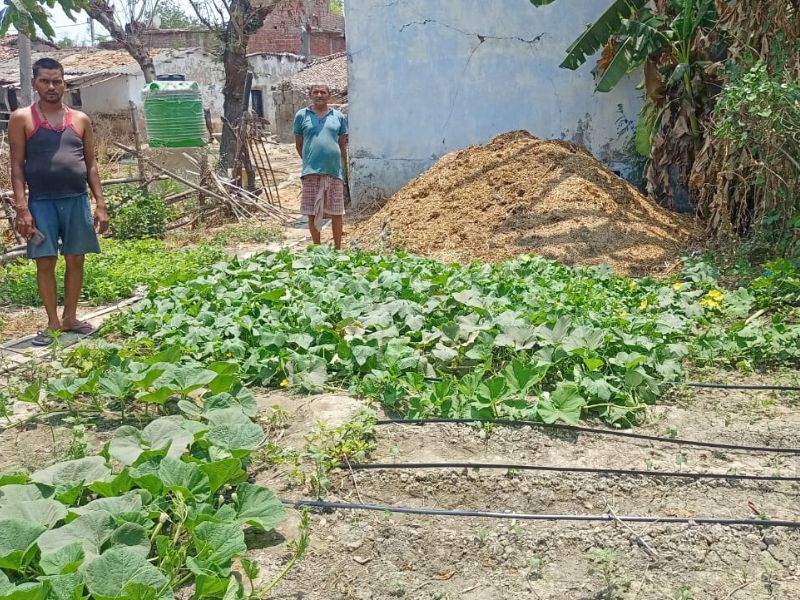

Thanks to the drip irrigation system, my farming is now more sustainable and profitable. It has also contributed to the overall food security of his community.
Santan Prasad, farmer in Taradih, Madanour, Aurangabad, India
Water at the Heart of Villages
At the village level, the construction of ponds and wells ensures a consistent supply of safe water. As always, communities actively participate in the implementation and management of these infrastructures, which also include water purifiers.

Wells are an essential infrastructure that ensures direct access to groundwater.
By providing families with a reliable water source, wells contribute to the water security of villages, particularly during drought periods.
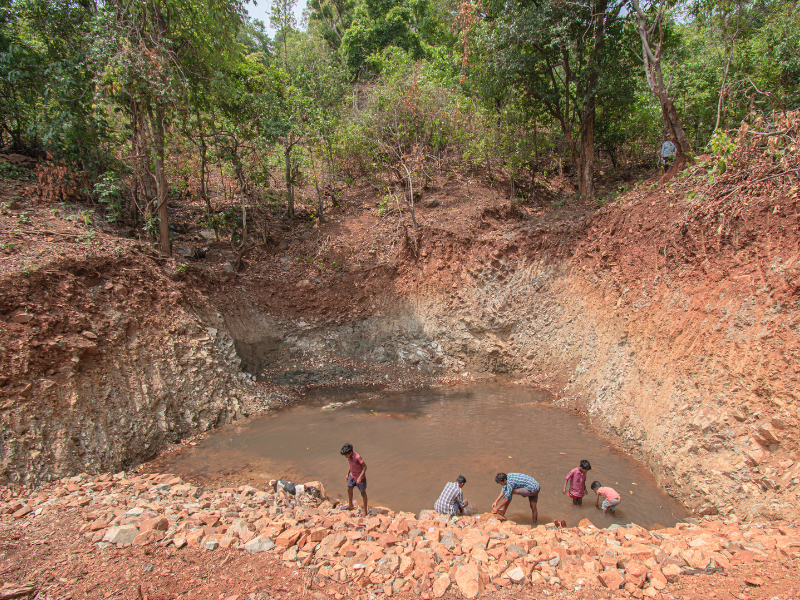
Ponds collect and store rainwater. By serving as surface reservoirs, they not only replenish groundwater but also promote a greener environment around these infrastructures.
Communities then benefit from collective access to water while improving the local ecosystem.

Karuna-Neer water purification systems, designed in partnership with Tata Swachh, a specialist purification brand, ensure sustainable water management. They aim to recover and treat water, offering an efficient solution to improve access to drinking water and reduce contamination risks.
In the last two years the water purifier has become an integral part of our daily water consumption. It has remarkably improved the health and wellbeing of us villagers. Earlier, we were consuming water from a malfunctioning well that caused several health issues affecting the children.
Kate Deogham, resident of Jharkhand

Discover a concrete case in Delho Village, India, which Karuna has supported for over ten years
Delho, a small village in Bihar with 123 households, long suffered from a severe water shortage. Groundwater levels, having dropped more than 45 meters, made supply insufficient and unstable. Despite fertile land, farmers struggled to irrigate their fields due to the lack of potable water.
Now the situation has dramatically improved thanks to projects like the construction of a pond and the distribution of irrigation kits. In addition to enabling the irrigation of fifty plots of land, fish farming has also been developed, bringing new economic opportunities to the community.

All United for Water Access

These projects were carried out in close collaboration with rural communities in Bihar and Jharkhand, helping to mitigate the impacts of the water crisis in these particularly affected regions.
Their success lies mainly in the collective work demonstrated by the populations with the support of Karuna.
Community participation is at the heart of every initiative, with villagers fully involved in the design and implementation, and through the provision of raw materials and labor.
For example, for the rainwater harvesting system, families contribute 18 euros, or 50% of the total project cost. Similarly, for pond construction, residents cover 40% of the costs by providing local resources and labor.
This involvement encourages ownership of the project by the residents and strengthens their commitment. It also helps reduce costs while ensuring efficient and sustainable use of resources.
Water Management Initiatives in Nepal
Rural and remote areas of Nepal face challenges of water accessibility, hygiene, and sustainable agricultural practices.
On one hand, one of the cornerstone projects is improving access to safe drinking water. Karuna Shechen has focused on the construction of small-scale water schemes that directly serve communities, schools, and health facilities.
7 drinking water schemes have been implemented, ensuring access to clean water for over 4,000 beneficiaries. Water quality testing is conducted to tackle health issues such as cholera and other waterborne diseases.
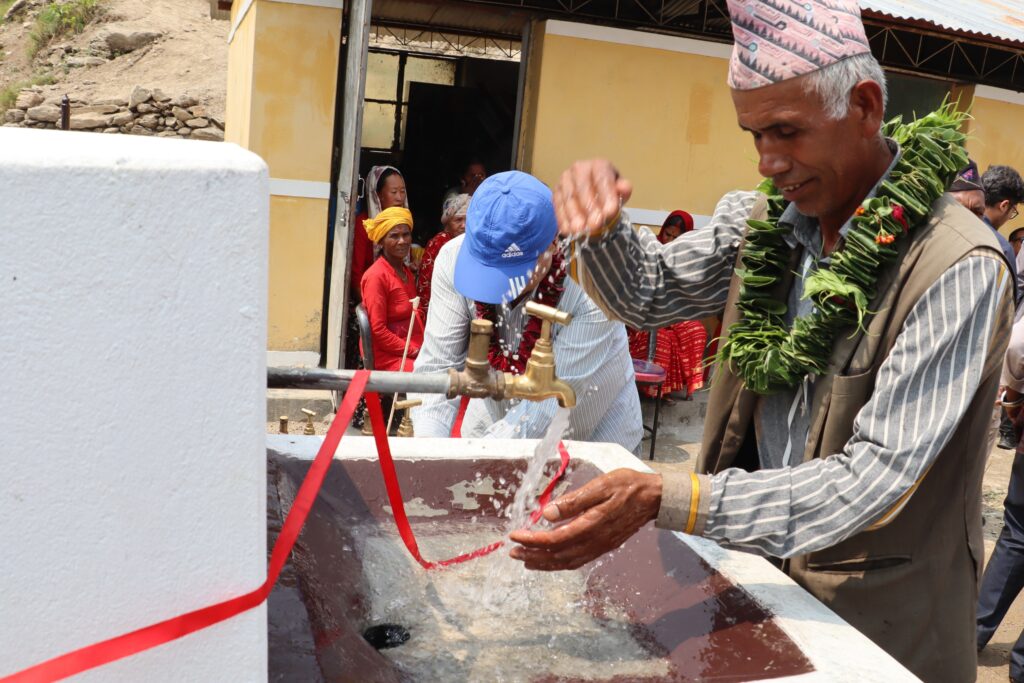
On the other hand, the agricultural landscape in Nepal is heavily dependent on the monsoon rains. To enhance agricultural productivity by improving access to irrigation is a priority.
Solar-powered water-lifting systems have been introduced to pump water from nearby rivers for irrigation and to mitigate the effects of dry spells, especially during the winter and drought seasons. This technology has been invaluable for maintaining agricultural productivity. Farmers are trained on sustainable irrigation methods and are supported with the necessary tools and equipment.
Every Drop Counts
Every drop counts on the path to sustainable water access, and the smallest action can actually become a big step. It is with this philosophy and its holistic approach that Karuna has been able to work directly alongside communities to develop initiatives that meet their specific needs.
The village of Delho is an excellent example: as projects were implemented, the villagers worked together to improve the quality of their lives.
Among these initiatives, rainwater harvesting systems offer an additional water source, complementing drip irrigation efforts, which in turn increase agricultural yields.
Together, they create an effective synergy, fostering integrated and sustainable water resource management beneficial to the populations.
Karuna-Shechen’s initiatives are part of a continuous adaptation to the growing challenges posed by climate change, which severely affects water access. These projects, in collaboration with local communities, will continue to evolve to ensure a lasting and meaningful impact, thus securing a better future for generations to come.
